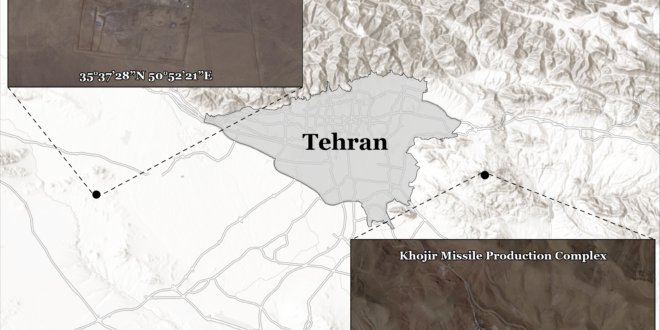- Iran is expanding its domestic drone and missile production capacities, which would enable further Iranian military support to Russia and the Axis of Resistance. Reuters, citing commercially available satellite imagery, reported on July 7 that Iran has expanded two defense industrial sites outside Tehran City in recent months.[i] The satellite imagery indicated that Iran has built over 30 new buildings at the two sites, which are meant to support the manufacturing of ballistic missiles and drones. A Western analyst that Reuters cited assessed that the expansion began at one site—the Khojir missile production complex—in August 2023 and at the other site—the Shahid Modarres base—in October 2023.[ii] The buildings are apparently still under construction. Anonymous Iranian officials speaking to Reuters claimed that Iran would transfer the drones and missiles produced at these facilities to Russia, the Houthis, and Lebanese Hezbollah. The satellite imagery of the Iranian sites also showed dirt berms surrounding many of the new structures, indicating the nearby presence of highly combustible materials.
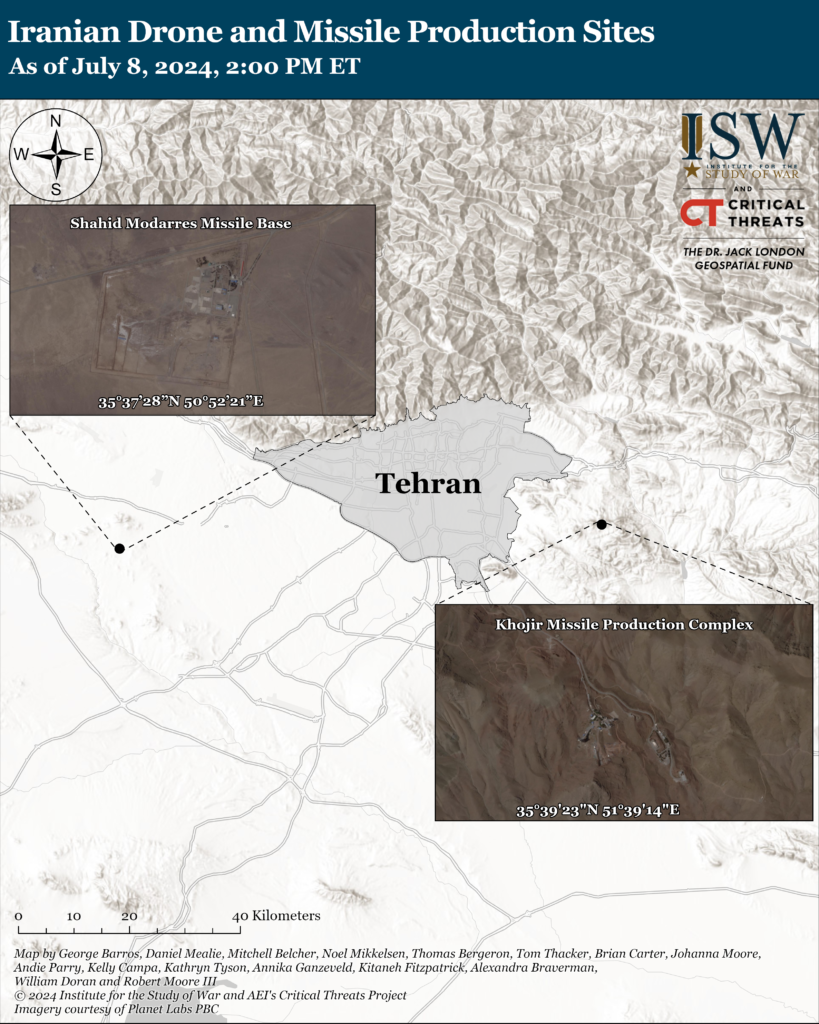
The expansion of the Iranian defense industrial sites come amid discussions between Iran and Russia to expand their military cooperation. Politico, citing anonymous sources, reported in April 2023 that Iran was negotiating a deal with Russia and China to send missiles to support the Russian invasion of Ukraine.[v] Western officials and media moreover indicated in January 2024 that Iran and Russia were continuing negotiations to supply Iranian missiles to Russian forces.[vi] Reuters reported in February 2024, citing anonymous Iranian sources, that Tehran had sent short-range ballistic missiles to Russia.[vii]
Iranian short-range ballistic missiles could improve the Russian ability to penetrate Ukrainian air defenses. Kremlin-affiliated milblogger Rybar claimed in February 2024 that the acquisition of Iranian missiles would enable Russian forces to hit “remote Ukrainian targets.”[viii] The Ukrainian Air Force spokesperson similarly said in February 2024 that Russia acquiring such missiles would pose a ”serious threat to Ukraine.”[ix] This Russo-Iranian military exchange is part of the strategic partnership that has developed between Moscow and Tehran since 2022, which CTP-ISW has covered extensively.[x]
Iranian President-elect Masoud Pezeshkian appears to be associating himself with members of the moderate Hassan Rouhani administration, which was in power from 2013-21. Pezeshkian identified former Foreign Affairs Minister Mohammad Javad Zarif as one of his close advisers and supports while running for the presidency.[xi] Zarif served in the Rouhani administration and played a prominent role in negotiating the Joint Comprehensive Plan of Action.[xii] Rouhani’s Information and Communications Technology Minister Mohammad Javad Azari Jahromi has separately been advising Pezeshkian throughout his campaign.[xiii] Pezeshkian has since winning the presidential elections met other members of the Rouhani administration, such as Rouhani himself and former Economic Affairs and Finance Minister Ali Taib Nia.[xiv] The connection between Pezeshkian and the Rouhani administration could indicate that Pezeshkian will draw from this network to build his cabinet. That Pezeshkian may be rallying support from Rouhani’s circles would be unsurprising given that Pezeshkian has not historically appeared to have a prominent support base independently. Pezeshkian will remain considerably constrained in his capacity as president, regardless of support from Rouhani and his network.
Masoud Pezeshkian held a phone call with Russian President Vladimir Putin on July 8, marking one of his first known call with a foreign official as president-elect.[xv] Pezeshkian advocated for the continued expansion of Russo-Iranian ties on the call.
Key Takeaways:
Iran-Russia cooperation: Iran is expanding its domestic drone and missile production capacities, which would enable further Iranian military support to Russia and the Axis of Resistance.
Iran Domestic Politics: Iranian President-elect Masoud Pezeshkian appears to be associating himself with members of the moderate Hassan Rouhani administration, which was in power from 2013-21.
Gaza Strip: Israel and international mediators are weighing options for interdicting Hamas weapons smuggling into the Gaza Strip in the event of an Israeli withdrawal from the Philadelphi Corridor.
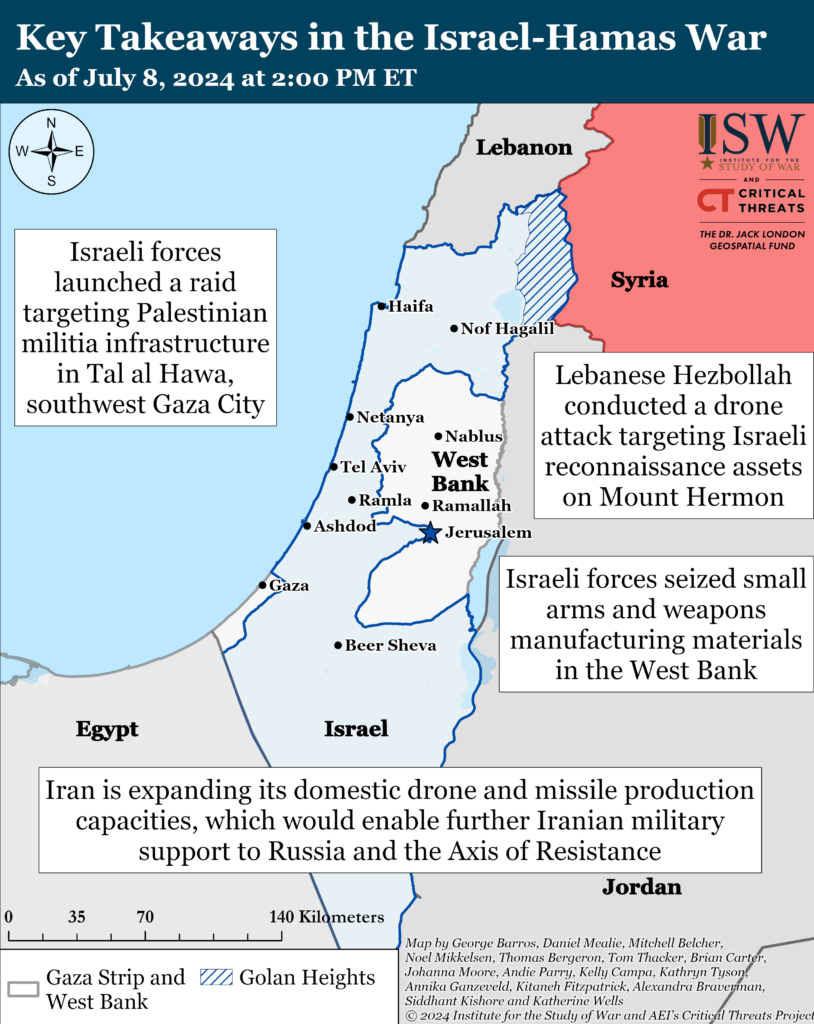
Gaza Strip
Axis of Resistance objectives:
Erode the will of the Israeli political establishment and public to sustain clearing operations in the Gaza Strip
Reestablish Hamas as the governing authority in the Gaza Strip
The Israel Defense Force (IDF) 98th Division continued operations in Shujaiya on July 8.[xvi] Israeli forces destroyed militia infrastructure and struck dozens of fighters who were firing anti-air anti-tank munitions.[xvii] The IDF 7th Brigade raided and destroyed a Hamas headquarters and fighting compound in a school and clinic in Shujaiya.[xviii] The IDF said that the Hamas Shujaiya Battalion hid[xix] The IDF Givati Brigade located and destroyed a weapons production site containing dozens of machine guns, mortars, grenades,[xx][xxi] Palestinian fighters mortared Israeli forces in Shujaiya on July 8.[xxii]
The IDF 99th Division launched a raid targeting Tal al Hawa, southwest Gaza City, on July 8.[xxiii] The IDF Commando and 8th Reservist brigades, along with Shin Bet , presumably moved northward into Gaza City from the Netzarim Corridor.[xxiv] The raid focuses on the UNRWA headquarters in Gaza City that Hamas and Palestinian Islamic Jihad (PIJ) have used to detain and interrogate individuals, hide fighters, and store weapons.[xxv] Israeli forces will also focus on locating central hubs of militia activity and hiding sites during the operation.[xxvi] This raid marks the IDF’s second re-clearing operation into the Tal al Hawa neighborhood.[xxvii] The IDF last cleared Tal al Hawa in February 2024 but has operated in adjacent neighborhoods since.[xxviii] The IDF destroyed a tunnel network and a Hamas “data center” underneath the UNRWA headquarters during the February 2024 operation.[xxix]
Hamas and PIJ targeted Israeli forces advancing into Tal al Hawa on July 8. Hamas and PIJ targeted Israeli armor with at least five separate improvised explosive device (IED) attacks in Tal al Hawa.[xxx] Two of the Hamas IED attacks used explosively formed penetrators, which is a particularly lethal and advanced type of IED.[xxxi] Hamas and PIJ also targeted Israeli forces with rocket propelled grenades, anti-personnel mines, and mortars.[xxxii]
The IDF issued evacuation orders for Sabra, Rimal, Tal al Hawa, and Daraj neighborhoods of Gaza City on July 8.[xxxiii] Israeli forces are actively operating in the evacuation area.[xxxiv] The IDF Arabic-language spokesperson ordered residents to evacuate to Deir al Balah in the central Gaza Strip.[xxxv] Evacuees must cross through the IDF-controlled Netzarim Corridor to get to Deir al Balah. The IDF uses the Netzarim Corridor to prevent Palestinian fighters from moving freely across the Gaza Strip as well as for launching raids.
Hamas and PIJ targeted Israeli forces and a headquarters along the Netzarim Corridor with mortar and rocket fire on July 8.[xxxvi]
The IDF 162nd Division continued clearing operations in Rafah on July 8. Israeli forces located tunnel shafts, confiscated weapons, and killed over 30 Palestinian fighters in Rafah.[xxxvii] Palestinian fighters did not claim attacks targeting Israeli forces in Rafah on July 8.
The IDF described the status of clearing operations in Rafah to several foreign journalists on a tour of the southern Gaza Strip on July 3.[xxxix] The IDF estimated that it has killed at least 900 members of the Hamas Rafah Brigade and 15,000 Hamas fighters in the Strip overall.[xl] Thousands of Hamas fighters reportedly fled Rafah before the IDF advanced.[xli] The IDF said that Palestinian fighters have rigged hundreds of houses to explode throughout Rafah.[xlii] The IDF has in contrast dismantled dozens of rigged-to-detonate buildings in Shujaiya.[xliii] These types of house-borne improvised explosive device (HBEID) attacks have inflicted the heaviest casualties on Israeli forces throughout the strip. The IDF has also discovered that Hamas installed cameras to monitor Israeli forces and plan attacks.[xliv] Hamas and its allied militias had months to prepare traps, surveillance assets, and ambushes in Rafah as Israeli forces cleared other parts of the Gaza Strip.
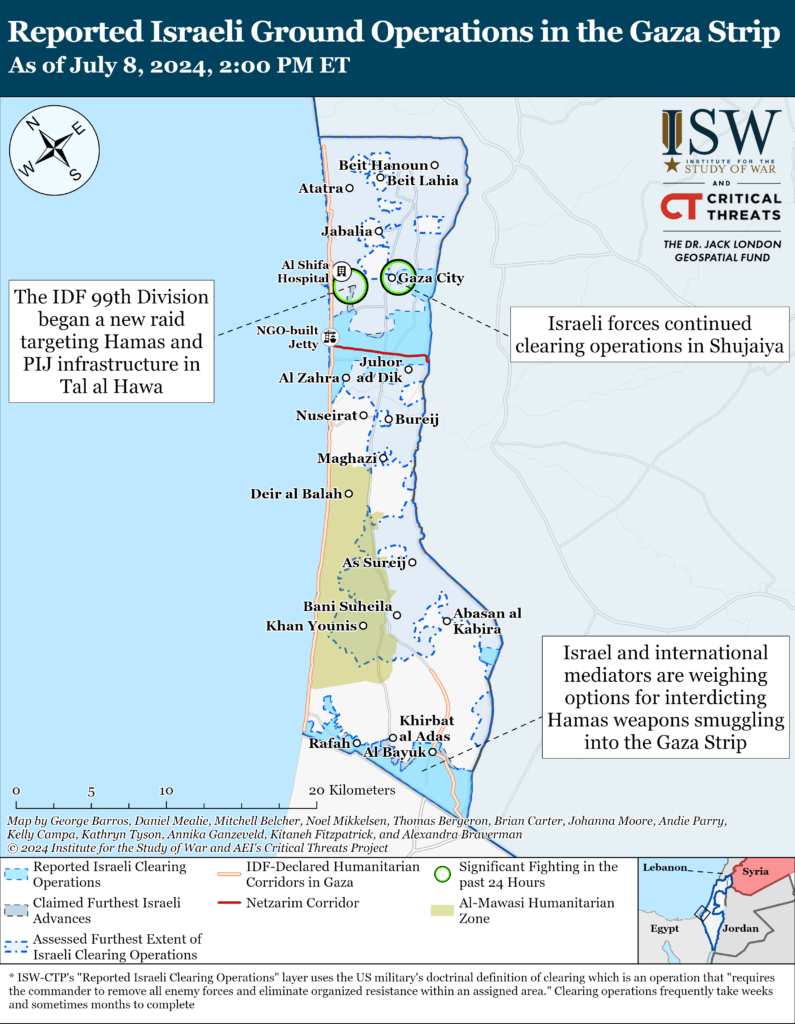
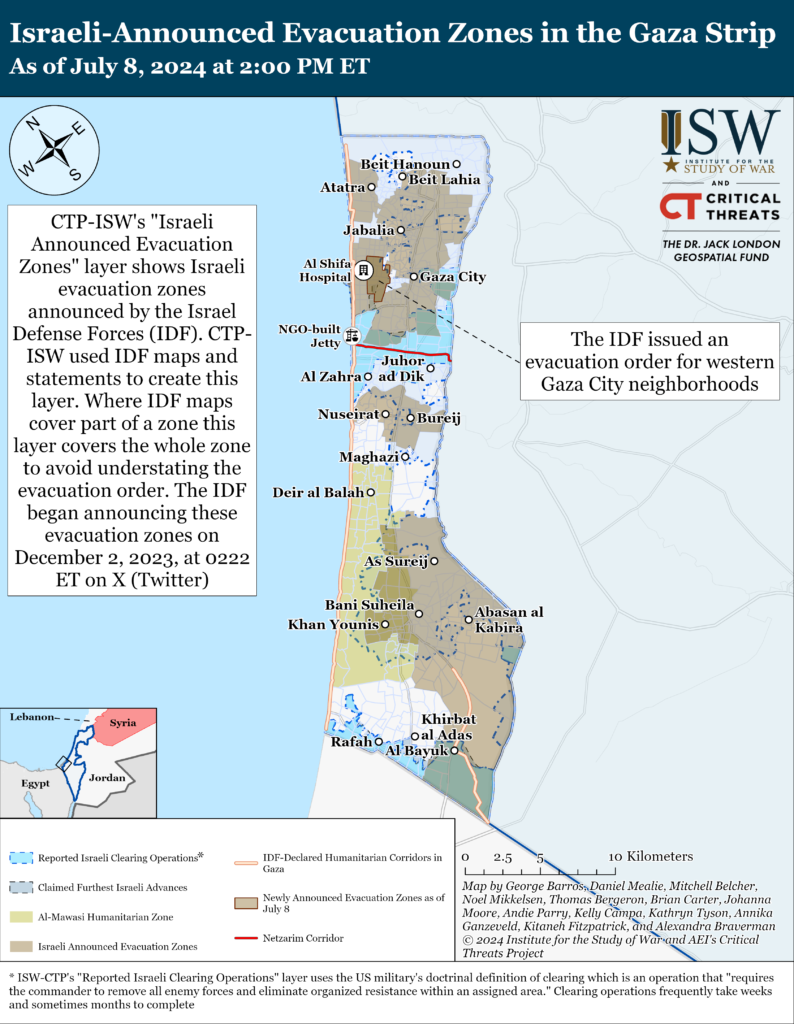
Israel and international mediators are weighing options for interdicting Hamas weapons smuggling into the Gaza Strip in the event of an Israeli withdrawal from the Philadelphi Corridor. Israeli Prime Minister Benjamin Netanyahu said on July 7 that any ceasefire deal would have to ensure that Hamas could not replenish its depleted arms supplies through smuggling along the Egypt-Gaza Strip border.[xlv] The IDF is currently preventing weapons smuggling through its control of the border strip, also known as the Philadelphi Corridor. The current ceasefire proposal would require Israeli forces to withdraw from the Gaza Strip, including from the Netzarim and Philadelphi Corridors.[xlvi] US, Israeli and Egyptian officials discussed how to prevent Hamas from smuggling weapons into the Gaza Strip from Egypt in Cairo on July 8.[xlvii] Egyptian officials have reportedly agreed to work with the United States to construct a “high-tech” underground barricade to prevent weapons smuggling into the Gaza Strip from the Sinai Peninsula.[xlviii] Israel is also reportedly considering covering the border in sensors to detect new digging.[xlix] The IDF has discovered dozens of tunnels that reach the Egyptian border from the Gaza Strip.[l]
The Associated Press (AP) reported on July 8 that several senior Hamas officials advocated for accepting a ceasefire agreement proposed by the United States, citing internal communications seen by AP.[li] AP stated that several unspecified Hamas officials in Gaza signed a statement urging exiled Hamas political leaders in Qatar to accept the ceasefire proposed by US President Joe Biden, citing heavy casualties and ”dire” conditions sustained throughout the war. An individual familiar with Western intelligence told AP that these communications occurred between ”May and June” and originated from ”multiple senior officials inside (Hamas’) military wing in Gaza.” Israeli, Egyptian, and Qatari officials declined to comment on the report. Hamas withdrew its previous demand that Israel commits to an end to the war.[lii] Hamas now demands that the US, Egypt, and Qatar commit to continue negotiations on the second phase of the deal without a specified timeframe.[liii] CTP-ISW previously noted that Hamas’ requested change could enable Hamas to drag on negotiations indefinitely with no mechanism to compel it to release the remaining hostages.[liv]
Three Palestinian militias launched two rocket barrages targeting an Israeli military site at Nahal Oz, which is in Israel east of Shujaiya, on July 8.[lv] Palestinian militias have accelerated the rate at which they target Nahal Oz since the IDF began an operation into Shujaiya on June 27.[lvi] Palestinian fighters also targeted an IDF site near Kerem Shalom on July 8.[lvii] The IDF Air Force separately struck two loaded rocket launch sites in Khan Younis and Gaza City on July 8.[lviii]
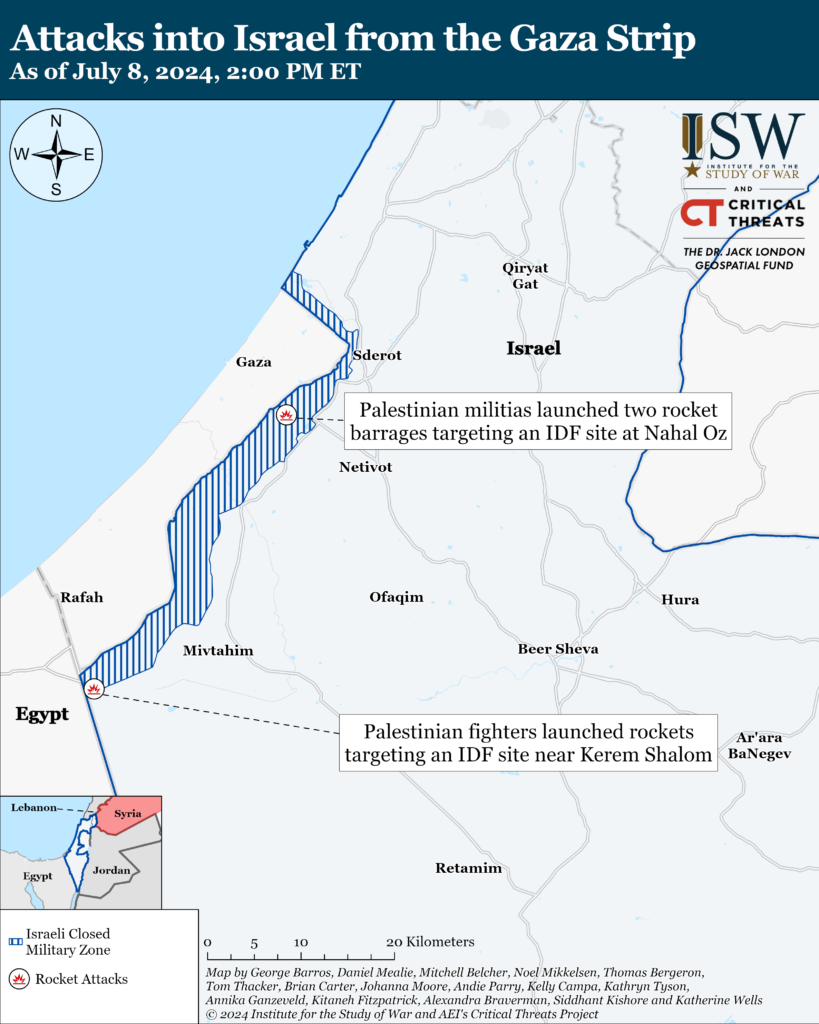
Recorded reports of attacks; CTP-ISW cannot independently verify impact.
West Bank
Axis of Resistance objectives:
Establish the West Bank as a viable front against Israel
Israeli forces engaged Palestinian fighters in four locations in the West Bank since CTP-ISW’s last data cut-off on July 7.[lix] The al Aqsa Martyrs’ Brigades said that it fired small arms targeting Bat Hefer—an Israeli town west of Tulkarm.[lx] This attack comes amid an uptick in Palestinian militia attacks from Tulkarm into Bat Hefer since April 2024.[lxi]
The IDF detained 22 wanted Palestinians and seized small arms and weapons manufacturing materials in overnight raids in the West Bank on July 7.[lxii] The IDF detained four Palestinians and confiscated M4s, M16s, Carlo rifles, and three lathes to manufacture unspecified arms near Hebron.[lxiii] The IDF detained a Palestinian in Jaber for producing explosives.[lxiv]
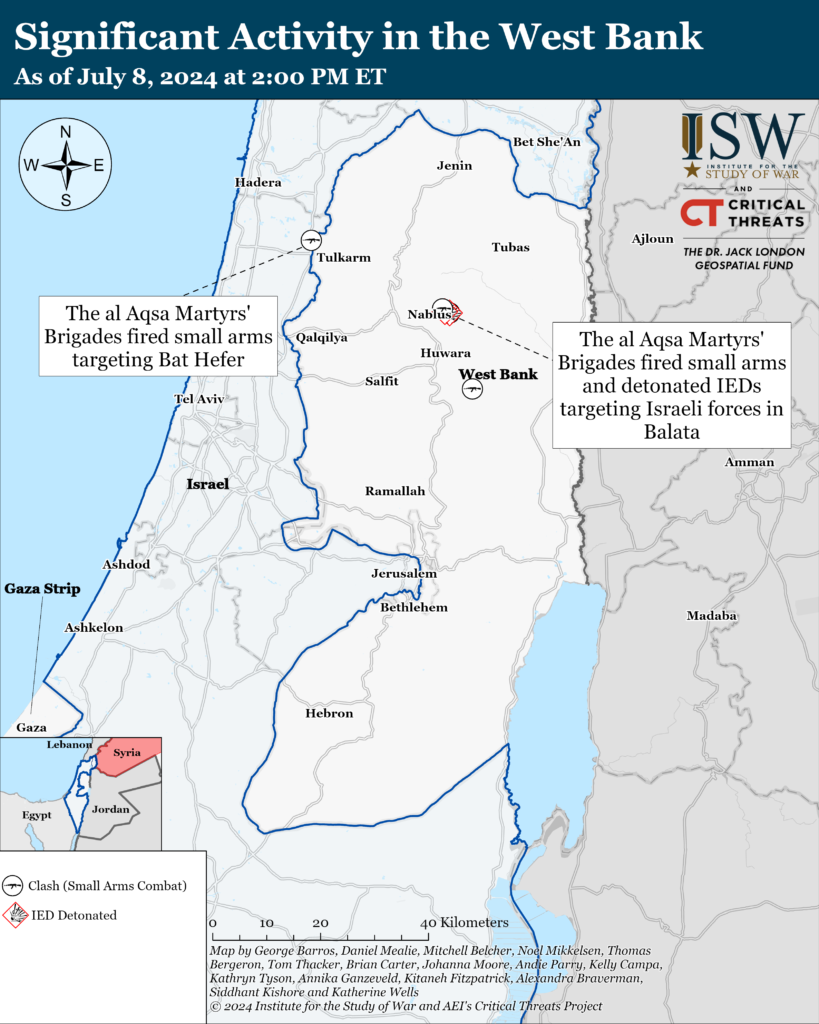
This map is not an exhaustive depiction of clashes and demonstrations in the West Bank.
Southern Lebanon and Golan Heights
Axis of Resistance objectives:
Deter Israel from conducting a ground operation into Lebanon
Prepare for an expanded and protracted conflict with Israel in the near term
Expel the United States from Syria
Lebanese Hezbollah conducted at least five attacks into northern Israel since CTP-ISW’s last data cut-off on July 7.[lxv] Hezbollah launched a drone attack targeting long-range Israeli reconnaissance equipment on Mount Hermon in response to an Israeli strike that killed a Hezbollah air defense engineer on July 7.[lxvi] The IDF said that a one-way attack drone fell in an open area near Mount Hermon.[lxvii] Hezbollah has previously targeted other IDF surveillance equipment and air defense assets in response to Israeli strikes into Lebanon.[lxviii]
The IDF killed a Lebanese Hezbollah missile and rocket unit member in southern Lebanon on July 8. The IDF conducted an airstrike targeting Mustafa Hassan Salman in a vehicle in Qlaileh, Tyre District, Lebanon.[lxix] The IDF said that Salman planned numerous attacks targeting Israel.[lxx] Hezbollah posted a tribute commemorating Salman.[lxxi]
Israeli Defense Minister Yoav Gallant visited Mount Hermon and said on July 7 that the IDF will continue to fight Hezbollah regardless of whether Israel reaches a truce with Hamas in the Gaza Strip.[lxxii] Gallant stated that Israeli activities would continue along the northern border unless ”Hezbollah reaches an agreement” with Israel. Gallant stated that IDF strikes have killed 450 Hezbollah and allied militia members, including 15 brigade-level commanders and three division-level commanders, in recent months. Gallant is likely referring to IDF strikes that targeted and killed an Aziz Unit commander on July 3, a Nasr Unit commander on June 11, and a senior Radwan Unit commander on January 8.[lxxiii]
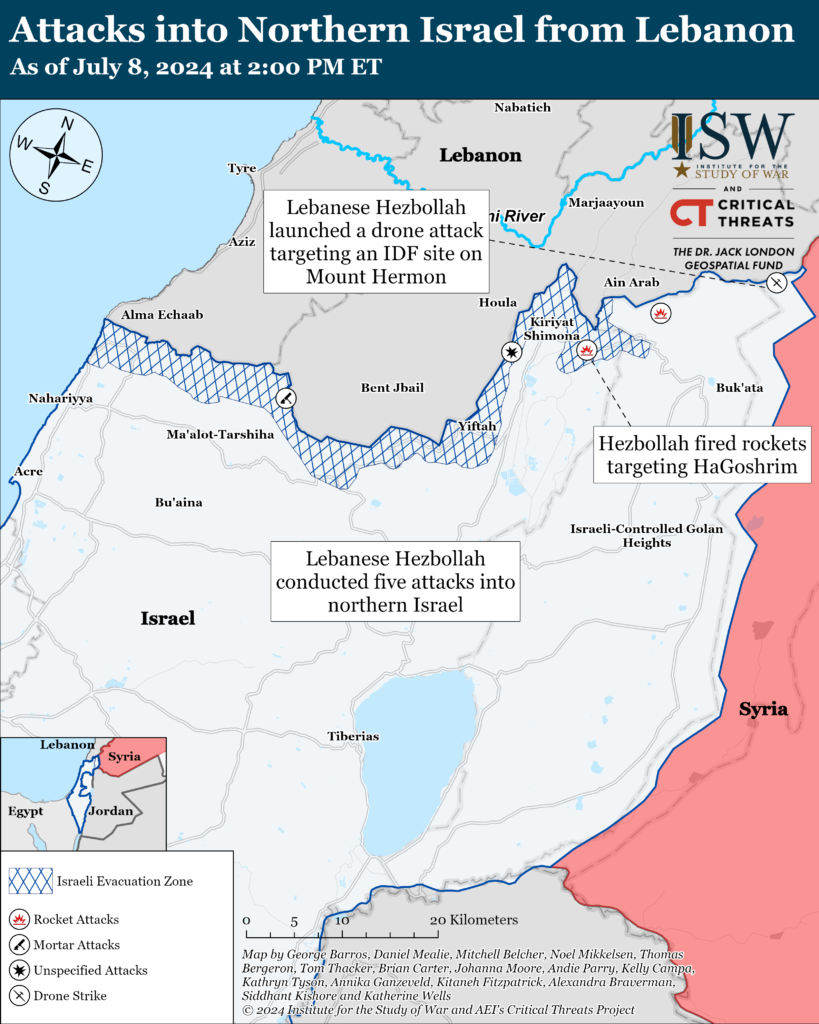
Recorded reports of attacks; CTP-ISW cannot independently verify impact.
Iran and Axis of Resistance
Iraqi Prime Minister Mohammad Shia al Sudani met with US Deputy Assistant Secretary of Defense for Middle East Policy Daniel Shapiro and US Ambassador to Iraq Alina Romanowski in Baghdad on July 8 to discuss expanding US-Iraqi bilateral defense relations and the withdrawal of the US-led international coalition from Iraq.[lxxiv] Sudani and Romanowski previously discussed the status of the US-led international coalition’s mission in Iraq on June 26.[lxxv] The US-Iraqi High Military Commission is tasked with setting a timetable for the withdrawal of US and coalition forces.[lxxvi] The commission began to evaluate the status of the US-led international coalition in late January 2024 and held the latest round of talks on April 8 .[lxxvii]
The Houthis have threatened Saudi Arabia in recent days for cooperating with the United States. Houthi supreme leader Abdulmalik al Houthi gave a speech on July 7 warning Saudi Arabia against unspecified cooperation with the United States.[lxxviii] Abdulmalik also boasted of the Houthis’ capability to respond to any Saudi escalation. The Houthis moreover suggested that they are capable of striking sensitive Saudi infrastructure on July 8 by publishing aerial photographs of major airports and maritime ports.[lxxix] The Houthis described the sites as potential targets if Saudi Arabia attacks Houthi positions in Yemen.
US Central Command (CENTCOM) destroyed two Houthi drones in Yemen on July 7.[lxxx] CENTCOM separately reported that unspecified partner forces intercepted two Houthi drones over the Gulf of Aden. CENTCOM stated these drones threatened US, coalition, and merchant vessels in the area.
Iranian Foreign Affairs Ministry spokesperson Nasser Kanani stated on July 8 that Iran “will not hesitate” to support Lebanese Hezbollah should Israel launch a major military offensive into Lebanon.[lxxxi] Kanani stated that such an offensive would trigger regional escalation and unrest. Senior Iranian officials recently have messaged that Iran and its Axis of Resistance could escalate severely in response to an Israeli offensive into Lebanon.[lxxxii]
An Iranian Moj-class light naval frigate, the Sahand, capsized in Bandar Abbas port on the Persian Gulf on July 7.[lxxxiii] Iranian state media reported that the frigate malfunctioned and began to take on water into while undergoing repairs.[lxxxiv] The accident injured several individuals. Iranian state media claimed that the ship returned to ”equilibrium” and that repairs are continuing. Head of Iran Shipbuilding and Offshore Industries Complex Salman Zarbi stated immediately after the incident that repairing the vessel is possible.[lxxxv] Photos circulated on social media showing the Sahand partially submerged.[lxxxvi] The Sahand recently led a flotilla of Iranian naval vessels in the Red Sea and Gulf of Aden amid Houthi attacks on international shipping.[lxxxvii] Iranian state media reported the Sahand was equipped with anti-air munitions and cruise missiles.[lxxxviii]
 Eurasia Press & News
Eurasia Press & News
